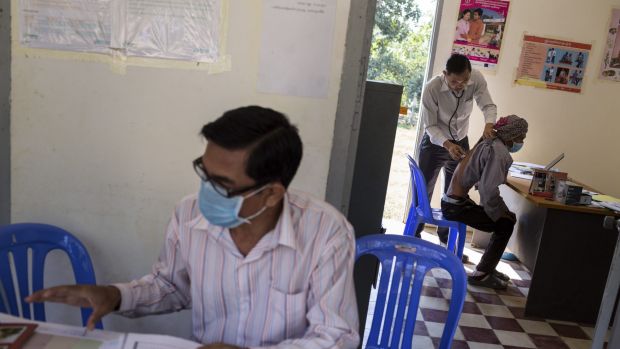
Hang Sivatha, left, and Dr Phe Thong at the Roka Health Centre. Photo: Nicolas Axelrod
Roka: Frail and depressed after her diagnosis, Chem Mao decided to take her life by climbing a mango tree in her backyard, fastening one end of a rope around a sturdy branch and the other around her neck, and jumping. As she shuffled weakly beside her cinder-block house toward her family’s small orchard she saw her grandchildren playing nearby and relented, collapsing into tears.
“I didn’t have enough strength to get up the tree,” she said. “Maybe I’ll try again another time.”
Mao, 55, is among more than 220 villagers in this rice-farming community in western Cambodia who tested positive for HIV last month. Cambodian authorities believe that an unlicensed doctor who reused syringes and other medical equipment spread the infection.

Em Mom prepares anti-retroviral medication for her mother, Chhay Yao, in Roka, Cambodia. Photo: Nicolas Axelrod
Even in a country inured to hardship and suffering, the infection of such a large number of people within a radius of a few kilometres was shocking.
The victims are everywhere – in the wooden stilt houses, in the paddies harvesting rice, in the gilded Buddhist temple at the entrance to the village, and in the playground of the ochre-coloured primary school. The 82-year-old abbot of the temple was infected, as were 12 children who attend the primary school.
Five minutes from the temple is a cluster of houses where 16 members of an extended family were infected.

Em Seiha, who learned she was infected with HIV, and Em Mom go to work in the rice fields in Roka, Cambodia. Photo: Nicolas Axelrod
What the victims appear to have in common is that they were treated by Yem Chrin, a village medical practitioner who was charged last month with aggravated murder, intentionally spreading HIV and practising without a medical licence. He is in prison while awaiting trial in the nearby city of Battambang.
The provincial prosecutor, Nuon San, said a number of people in the area died from HIV in the past and the authorities are investigating whether Chrin may have been responsible. Officials quoted in the Cambodian news media said Chrin had admitted reusing needles and syringes.
For two decades, Chrin made house calls to sick villagers here, one of seven unlicensed doctors in the community, Cambodian officials said. He trained and practised as a nurse in a refugee camp during the convulsive years after the fall of the Khmer Rouge in 1979, according to his daughter, Chrin Reaksa.
When he moved to Roka, “more and more people asked him for help, so he started his medical practice,” Reaksa said. “The government never expressed any concerns about a licence.”
Many villagers, even those infected, staunchly defend Chrin, describing him as a kind man who treated even those who could not pay. “Honestly I don’t think the doctor caused this,” said Chhay Yao, 76, the matriarch of the family in which 16 people were infected. “He was so clean. And he’s not a bad person. If we had money we gave it to him. If not he would always say, pay me later.”
He made house calls, and was happy to oblige villagers who preferred a drip or injection instead of pills. The villagers’ affection for the doctor does not blunt their pain and bewilderment over the mass infection. Prum Em, Yao’s 84-year-old husband, stares with blank incomprehension when asked about the infections, which struck across three generations.
“I have done only good deeds my whole life,” he said. “It’s inconceivable that the family could have this much bad luck.”
One relative, Em Seiha, 23, passed out when she learned she was infected.
“I was worried that my husband would think that I had had an affair,” she said.
An HIV infection is no longer the death sentence it once was and the Cambodian government is providing free anti-retroviral medication, the drugs that suppress the virus and stop its progression. But Seiha feels condemned. “I’m afraid that I’m going to die at an early age, leaving my son behind,” she said.
Family members say they are treated with suspicion when they travel outside the village, including one mother who was instructed to wash her hands with antibacterial gel when the clerks in a shop learned she was from Roka.
In a country of extreme poverty and lax law enforcement, it is not yet clear how widespread the reusing of needles is and whether this was a tragedy waiting to happen. Prime Minister Hun Sen initially expressed disbelief that the tests were correct. “Right now, 99 per cent, I don’t believe it’s AIDS,” he was quoted as saying in the Cambodian media.
There are no nationwide statistics of the number of unlicensed doctors but the Ministry of Health is committed to reinforcing the law, said Ly Penh Sun, the deputy director of the National Center for HIV/AIDS.
Roka is about five kilometres from the nearest paved road and a 15-minute drive from Battambang, a hub of commerce in western Cambodia.
Soeun Sophath, the deputy head of the government-run village health clinic, which is staffed with nurses,said the first sign that something was wrong here was in August, when a routine HIV screening of a pregnant woman came back positive. It was the first positive result in the village since the screening program began two years ago, and health workers could not find an explanation for the infection. When another pregnant woman tested positive in November as well as an elderly man and his daughter-in-law, villagers panicked and stormed the health centre to be tested. Dozens tested positive.
“They were crying and crawling on the ground and hugging each other,” Sophath said. “I was crying, too. I was shocked.”
New York Times
